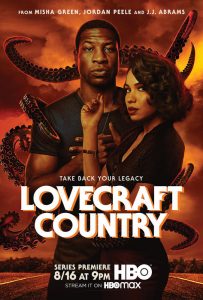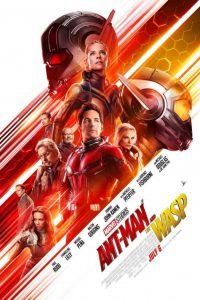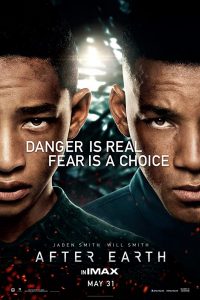Grand Wizardry: Josh Pearce and Arley Sorg Discuss Lovecraft Country Episodes 1 & 2
 Avid science fiction reader and down-low nerd Atticus Freeman AKA “Tic” (Jonathan Majors) returns to Chicago from the Korean War and a stint in Florida to find that his father has gone missing. The only clue left behind is a strange letter talking about a secret legacy, enticing Tic to journey to Ardham MA, deep within the borders of Lovecraft Country. Courtney B. Vance plays Uncle George Freeman, author and publisher of the Safe Negro Travel Guide; a character concept based on Victor Hugo Green and his The Negro Motorist Green Book (published from 1936 to 1966). George was already preparing to hit the road and continue the publication run, mapping safer routes and stops for Black people. Letitia Lewis – Leti – (Jurnee Smollett) is the wilder of two sisters who are both known for their singing, recently returned to her hometown. Tic’s childhood friend and formerly “the only female member of the Southside Futurists Science Fiction Club,” Leti joins the guys on a cross-country journey.
Avid science fiction reader and down-low nerd Atticus Freeman AKA “Tic” (Jonathan Majors) returns to Chicago from the Korean War and a stint in Florida to find that his father has gone missing. The only clue left behind is a strange letter talking about a secret legacy, enticing Tic to journey to Ardham MA, deep within the borders of Lovecraft Country. Courtney B. Vance plays Uncle George Freeman, author and publisher of the Safe Negro Travel Guide; a character concept based on Victor Hugo Green and his The Negro Motorist Green Book (published from 1936 to 1966). George was already preparing to hit the road and continue the publication run, mapping safer routes and stops for Black people. Letitia Lewis – Leti – (Jurnee Smollett) is the wilder of two sisters who are both known for their singing, recently returned to her hometown. Tic’s childhood friend and formerly “the only female member of the Southside Futurists Science Fiction Club,” Leti joins the guys on a cross-country journey.
Arley: The best way to subvert Lovecraft is to forget he ever existed and ignore him.
Josh: Sure.
Arley: Not to use his monsters, and invoke his name, and like, we’re all talking about it! If you want to dismantle his power, ignore his ass.
Josh: We have to keep saying his name, even just to review this. It’s in the title.
Arley: I went in not knowing that much about the show. I almost turned it off. There’s this opening scene with two Black people talking about a book with a racist hero, and basically discussing if it’s okay to read works by racists. I had to pause the show and hit the internet. I was like, this had better not be by a white person, having two Black characters justifying for the audience that it’s okay to read racist shit. Okay – thank the gods: Jordan Peele and Misha Green. Good, I can watch this. I mean, they could have tapped a Black author, though. Plenty of Black authors out there subverting racist works, LaValle, Jemisin, and more; they’d love that HBO money.
Josh: Not that there’s anything wrong with Matt Ruff, who wrote the book this show is based on. I mean, I don’t know his politics, but from all of his books that I’ve read he doesn’t seem to be crazy-racist-Nazi-dude. He’s not doing this to glorify Lovecraft. However, here’s a story all about being Black in America, written by a white guy.
Arley: And who knows more about being Black in America than a white dude?
The good news is that moments of this show are a wonderful celebration of Black culture, executed in ways too rarely seen in mainstream TV or film. An early scene shows a block party filled with joy and celebration, and an array of kinds of Black folks, sending a gentle message to the viewer that even in hostile times, there is more to Black lives than just perseverance or survival of suffering (which is often the sole focus of other depictions): there is beauty. There is happiness. The first relationship shown demonstrates positivity and love, offsetting stereotypical Hollywood images of Black families and simultaneously setting the groundwork to allow for developing more complicated, painful relationships. Black people can be nerds, they can be into astronomy, they can be into reading, they can be into travel; they aren’t limited by standard, stale, overused stereotypes. All of this and more adds up to great, diverse representation of Black people.
Arley: I don’t know how involved he really is in the making of the show, but Peele loves to throw in references, allusions, allegory, and so on. There are plenty in this show. For example, a major parallel is Tic: as he’s discussing that book [title redacted], the racist one with the Confederate protagonist, Tic is also a character returning from a war, and he’s also going through a portal in a sense. As soon as he gets the letter from dad, he begins his journey into the strange.
Josh: Some of the references are in the source material, maybe not to the same degree, visually, but that book is kind of a pastiche of past horror writers, not just Lovecraft.
Arley: I feel like the show is deliberately utilizing a lot of Black references, too. We have all these books by racist or questionable individuals being discussed, for example, and then the camera does a close up on The Count of Monte Cristo, and I kind of felt like, okay, it’s partly setup, but also, they’re saying hey, white racists weren’t the only people writing books. Alexandre Dumas was Black. Check it out. You have choices.
Josh: With all the stuff going on in this show, I totally forgot that they even had The Count of Monte Cristo in a scene, and then in the next episode a character uses a technique from that book. Even though I missed, like, half of that reference, it still comes across as good writing. It’s set up really well.
There’s a lot of skillful writing happening in the show. Great scenes like the block party are not just about vibrant mood, they also do efficient work introducing characters and situations. Character backgrounds often reveal aspects of other, intertwined character backgrounds. Story elements are set up and brought into play later. Each character is individual but within minutes of their screen time you get a strong sense of who they are and what’s important to them. Buckets of information are delivered without being boring. The show does lean on a few clichés, such as the “we don’t serve your kind” moment (which is factual, but also a go-to for narratives about race, especially utilizing food establishments) and the “mysterious savior” character, who swoops in and vanishes, only to be discovered later; but these and other clichés are forgivable considering the work put into everything else.
Arley: There’s this aspect of the travel guide, and sometimes I feel like it’s really just a tool to hammer in the idea that it’s really dangerous to be a Black person. Some of it is so understated – like, when Uncle George talks about walking being hard because of his shattered knees, something about that delivery is so soft that emotionally it doesn’t hit me at all.
Josh: In the novel, I believe the travel guide also gives the characters reason to go to other places in the country and find more racists or Lovecraft stuff. It’s kind of like a quest thing. From what I read, it’s not just these three characters, but who knows? They could deviate from the source material as the show continues.
Arley: Unlike the movie The Green Book, which takes a concept that was for Black people and centers a white character, this movie takes a concept for Black people and centers Black characters.
Josh: I never saw that movie so I have no comparison reference.
Arley: When I saw that there was a movie called The Green Book and it was starring a white guy, I was like, nah I’ll pass.
When it comes to the horror, some of it is great. The effects are solid and the tactics range from high tension low violence scenes to quiet, creepy moments, to brief but jarring extreme violence. The monsters look cool. The cinematography switches smoothly from beautiful landscapes (juxtaposed by the implicit horror of the omnipresent racism) to eerie scenes – dark bridges, shadowy woods, lonely cabin, an ornate lodge, a stone tower.
Josh: I thought it was… interesting that they put Shoggoths in right off the bat. This is the first episode, so what are they going to do after this to escalate it? Are they going to actually confront Cthulhu?
Arley: I thought the monster effects were really cool. For me, though, the absolute best horror moment of the whole thing, the most effective, the most well written, was that moment when they’re pulled over, they have that exchange, and then they start driving. The timer is set. They have to get across the county line before sundown, in minutes, and they can’t speed. The sheriff – you know he’s going to follow them. That first shot when they’re on the road is so crucial: she looks back and the road is empty. But you know that fucker is coming. That shot, that sequence, was the most riveting moment in cinema I’ve seen in a long time. I was absolutely on the edge of my seat. Even though I knew how it would play out, even though I knew how the sequence would end, it was just… incredible.
Josh: I don’t like watching shows where the white racists are like, you’re gonna say what I want you to say, or I’m gonna kill you. That sense of complete powerlessness is infuriating to me, even as a viewer. I’m always shouting at the screen, “You should kill the sheriff,” or, “You should fight that Nazi!” But in that moment, being held at gunpoint, you just can’t. So that’s one level of horror, obviously, but to me that’s a worse level of horror than the monster coming and biting people’s head off. Which is, clearly, the entire point of the show. Monsters don’t exist, but those exact helpless situations do.
Arley: I was like, holy shit, whoever is putting this together, they have talent, they have skill.
Josh: This show is such a weird concept to begin with. If someone watched the first episode without any context – starting with a weird dream, and ending with monsters biting peoples’ heads off – if the rest of the episode hadn’t been written with good plot and good tension, it would have just flopped.
While the show obviously deals with racism, and the ways in which it deals with racism are thoroughly discussed in a variety of places, there are a lot of other important, powerful themes at play as well. Abusive relationships and the legacy of abuse, for example. This is discussed mainly through the tense brotherhood of Uncle George and Tic’s dad, Montrose Freeman (Michael Kenneth Williams), the abuse they suffered from their father, the complicated ways that changed them as people and transformed the way they relate to each other, and the way violence trickled down to Tic as a child. After two episodes, the complications of familial abuse informs the viewer’s understanding of the way Tic deals with the situations he faces, and lends gravity to later events of the show.
Arley: I feel like the discussion of abuse is the hidden heartbeat of the show, and it gets missed by a lot of people because of the loudness of the more obvious themes. The uncle tells the dad, “You were brimming with love as a boy despite being afforded so little.” But it’s also shining a light on things like notions around masculinity, fatherhood, what it means to be a man, interrogating negative cultural aspects which get normalized.
Josh: There are these smaller emotional beats which are overshadowed by all this crazy fantasy. There’s a daughter who is neglected because she’s not a son. This show is filled with sexism and I don’t know if there’s any commentary on that just being lost in the shuffle, or if they haven’t gotten to it yet. I liked Letitia a lot. There’s a great scene where they show her screaming into a towel, having a meltdown, then she snaps back and just gets on with it. It’s an effective way to show that the character is having a realistic reaction to this insane situation, but the show doesn’t dwell on it. It was enough to be believable, and fits with her character. She’s practical enough to say, “Okay, stuff is fucked up but we need to get out of here.”
Besides casting racism as a monster more insidious and pervasive than the fantasy monsters, there’s also a racist cult (with hints to actual organizations) backed by a rich guy, complete with those standard foreshadowing lines, the cumulative effect of which runs parallel to stories like Jurassic Park and Westworld: wealthy people playing with forces they don’t understand and getting themselves into trouble. The cult is run by Titus Braithwhite (Tony Goldwyn) and progeny, made up to look like the most pale-skinned, blond people possible. While the plot is pure trope and predictable, the story is enriched by metaphors: the discomfort of a Black individual entering white spaces, especially when invited under suspect pretenses; the physical exploitation of Black bodies for white gain; and so on, all of which echoes Peele’s earlier film Get Out.
Arley: One of the most interesting messages is in the hallway, when the group comes together, and the uncle says, “Don’t question yourself, that’s how they win. They wanna make you crazy.” And I feel like that’s a powerful message, and it’s almost breaking the fourth wall. The filmmakers are practically looking at the camera and telling people of color: look, what we just showed you, that is America, and you need to get your shit together, you need to realize that America is fucking with you, and you need to stay strong and have confidence in yourself.
Josh: How do you think it compares to Watchmen? There is something kind of similar to them, or they remind me of each other.
Arley: For me, you almost have to talk about them together. Watchmen opened with the Tulsa massacre, and that was sharp and visceral and powerful. Episode one of this show is not as visceral and powerful, but is engaged in more discussions on a variety of levels. Watchmen smashes you over the head with it, and has a Black protagonist and Asian antagonist, but after that, racial discussion in Watchmen starts to peter off. In this show, it becomes more complex, and they center Black characters. Both shows add to the cultural discussion, but they are so different – Watchmen, towards the end, the focus shifts so much to Doctor Manhattan and Ozymandias; it’s like… well, we talked about race, now we’re talking about, “what if you could do anything! Would you be bored? Would you fall in love?” People of color lose screen time. Watchmen is kind of, at first, more shocking, and this show is more of a slow burn –
Josh: It’s a little more horrifying. It’s cool that HBO made two shows so closely together with this kind of material I wasn’t expecting to see on such a big platform. Not just because it’s discussing race, but also because they are science fictional settings discussing these issues as huge TV shows. I also gotta say, the music in this show is great.
Created by: Misha Green
Written by: Jonathan I. Kidd, Sonya Winton, Shannon Houston, Kevin Lau, Wes Taylor, based on the novel by Matt Ruff
Starring: Jonathan Majors, Jurnee Smollett, Michael Kenneth Williams, Aunjanue Ellis, Wunmi Mosaku, Abbey Lee, Jada Harris, Courtney B. Vance, Jamie Chung, Mac Brandt, Alex Collins, Joaquina Kalukango, Deron J. Powell, Jonathon Pawlowski, Jamie Neumann, Chase Brown, Shawn Ray Cartel & Marcus A. Griffin, Jr.

ARLEY SORG, Associate Editor, grew up in England, Hawaii, and Colorado. He studied Asian Religions at Pitzer College. He lives in Oakland, and usually writes in local coffee shops. A 2014 Odyssey Writing Workshop graduate, he is soldering together a novel, has thrown a few short stories into orbit, and hopes to launch more.
JOSH PEARCE, Assistant Editor, started working at Locus in 2016. He studied creative writing at SFSU and has sold short stories and poems to a variety of speculative fiction magazines. Born and raised in the Bay Area, he currently lives in the East Bay with his wife and son and spends way too much time on Twitter: @fictionaljosh. One time, Ken Jennings signed his chest.
 While you are here, please take a moment to support Locus with a one-time or recurring donation. We rely on reader donations to keep the magazine and site going, and would like to keep the site paywall free, but WE NEED YOUR FINANCIAL SUPPORT to continue quality coverage of the science fiction and fantasy field.
While you are here, please take a moment to support Locus with a one-time or recurring donation. We rely on reader donations to keep the magazine and site going, and would like to keep the site paywall free, but WE NEED YOUR FINANCIAL SUPPORT to continue quality coverage of the science fiction and fantasy field.
©Locus Magazine. Copyrighted material may not be republished without permission of LSFF.







